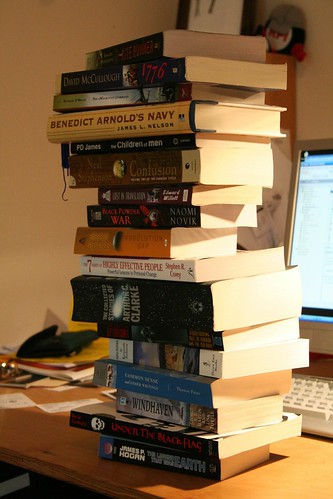
I have a theory.
My theory is that I don’t like Hugo winning novels. If you’re not familiar with the Hugos, it’s like the Academy Awards for Science Fiction and Fantasy. There’s a whole bunch of categories, but the one that gets the most attention, and that I’m talking about now, is “Best Novel”.
Back to my theory. I have picked up several books simply because they won the Hugo. This was because I was looking for something to read and I figured I might as well go with a book that was recommended through a vote. So far, my track record for actually liking these books is poor. Let’s review.
- A Fire Upon the Deep, by Vernor Vinge. Tie in 1993: Couldn’t get more than a third of the way through it. Every time something seemed to be happening…it didn’t. Gave the book away.
- Speaker for the Dead, by Orson Scott Card. Won in 1987: The book prior to that in the series, Ender’s Game (won in 1986!) was fabulous. Speaker for the Dead was deadly dull. Interesting concept, but I read for fun, not for concepts.
- Neuromancer, by William Gibson. Won in 1985. Yes, I know it’s the book that started Cyberpunk. That doesn’t mean I didn’t find it difficult to fathom and somewhat boring.
- Downbelow Station, by C. J. Cherryh. Won in 1982. Oh…my…god was I depressed before I put the book down. And I only got about a third of the way in. No thanks.
- The Dispossesed, by Ursula K. Le Guin. Won in 1975. Booooring. I’m glad I read it, but I’ll never read it again. My sister Cindy will probably send me a mail bomb because of this comment.
- Rendezvous with Rama, by Arthur C. Clarke. Won in 1974. This was more like a space engineering treatise than a good book. I didn’t read the sequels because the first one didn’t capture me.
- Stranger in a Strange Land, by Robert Heinlein. Won in 1962. This was one of those novels that you must read if only to maintain your geek credentials and grok everyone else’s. However, I wasn’t sold on its glorious nature. Would not Buy Again.
- A Canticle for Leibowitz, by Walter M. Miller, Jr. Won in 1961. I’ve tried, and failed, to read this book 3 times. I may give it one more chance before deep-sixing it.
That is eight books of fifty-five that I didn’t like. What about ones that I did?
- American Gods, by Neil Gaiman. Won in 2002. Fabulous.
- Harry Potter and the Goblet of Fire, by J.K. Rowling. Won in 2001. This award I find amusing because I believe it was surfing the wave of popularity rather than any real deservedness. Of all the HP books, HP and the Prisoner of Azkaban would be my pick. I still liked Goblet, though.
- The Diamond Age, by Neal Stephenson. Won in 1996. This is one of my favorite books, ever.
- Enders Game, by Orson Scott Card. Won in 1986. Also one of my favorite books, ever.
- Foundation’s Edge, by Issac Asimov. Won in 1983. This one gets a thumb up (but not two) from me. I’ll still qualify it as a book I liked, though.
- The Forever War, by Joe Haldeman. Won in 1976. Excellent book.
- Ringworld, by Larry Niven. Won in 1971. There isn’t much written by Larry Niven that I wouldn’t have buried in my coffin with me.
- Dune, by Frank Herbert. Won in 1966. Great great story. I can see the point of view of people who don’t like it, but I think it’s great.
- Starship Troopers, by Robert Heinlein. Won in 1960. Another of my favorite novels.
That makes nine novels of fifty-five that I like, and eight that I don’t (I could take this further and also analyze the novels that were nominated, but that’s a bit much, for reasons that will be explained in a moment). You would think that a greater than 50% success rate would make me happy, no?
No!
I demand 100% client satisfaction! And in order to have a good data set before sending in my lawyers, I’ve decided that I need to read the rest of the Hugo-winning novels and see which ones I like. Through the good services of Paperbackswap.com I have acquired several of them, and we’re waiting for them to come to the top of the queue before I start digging in. To Say Nothing of the Dog, by Connie Willis (1999), Jonathan Strange & Mr Norrell, by Susanna Clarke (2005), and Hominids by Robert J. Sawyer (2003) are the first in line. I also have The Curse of Chalion, by Lois McMaster Bujold, which is the first book in a trilogy before Paladin of Souls (2004).
So, I’m going to read the rest of the Hugo list and see what opinions I end up with. I’ll let the interwebs know how it’s coming along.

